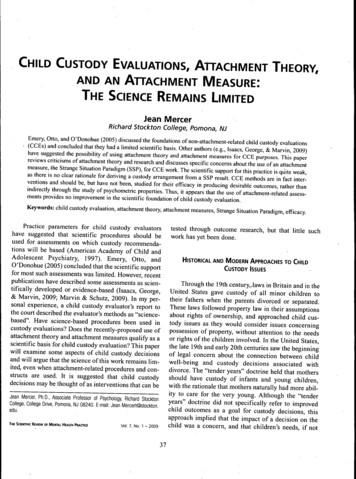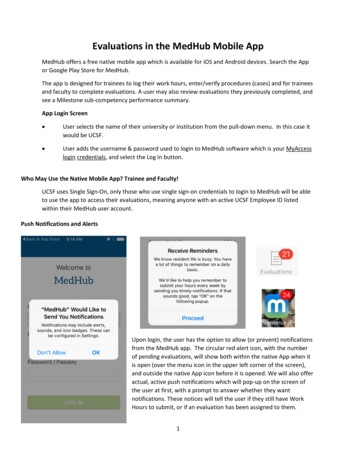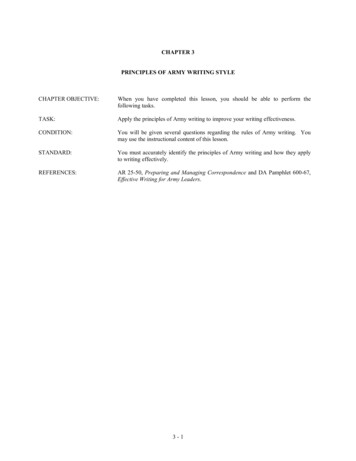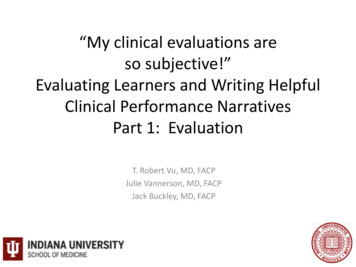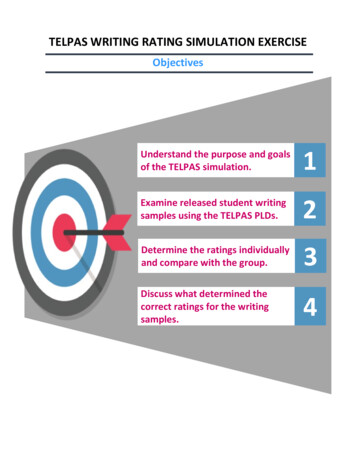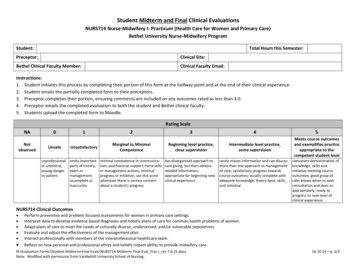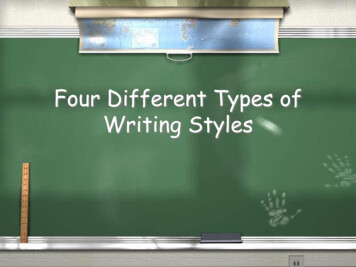
Transcription
Writing Student EvaluationsJennifer Leib, LCSW-Cjleib@health.umd.eduUniversity of Maryland, College ParkHealth Center, Mental Health Service
Evaluations: One More Thing to Do? Whyevaluations are important Making them work for you
Making the Evaluation Process MoreManageable
Things to Keep in Mind WhenPreparing to Write an EvaluationEvaluations are continual, not a staticrepresentation of one day or week Remember the learning contract? Examples, examples, examples!
Writing the Advanced ClinicalEvaluationDifferences between Fall & Springsemesters Importance of the narrative section Be specific
Writing the Advanced ClinicalEvaluation Considerations Caseload Adjustment to the agency Supervisors’ Meeting Weekly Staff Meeting Case Conference Thirst for learning?
Using Supervision to Guide YourEvaluationPsychotherapy – teaching an art Parallel process of supervision Incremental feedback
What to Look for in Supervision toCreate the Evaluation Arrive on timeAppropriate attire (agency specific)Have an agenda – ownership of supervisionTimely completion of paperworkThoroughness of clinical notesBasic vs. advanced questionsBoundaries – with supervisor & with clientsAbility to contain personal issuesConfidence levelWillingness to take appropriate risksUnderstands & is able to use the DSM to diagnose
What to Look for in Supervision toCreate the Evaluation, continuedAwareness of cultural implications & differencesUnderstands connections between theory &practice Open to feedback Ability to implement interventions taught insupervision Awareness of transference &counter-transference Ability to implement use of self in session Process vs. content (ability to sit with feelings) What it’s like to sit with them / Energy Parallel process of supervision
Involving Your Student in theEvaluation ProcessNo surprises! Have your student write a list of theirstrengths & areas for work Reviewing the evaluation with yourstudent Reference letters as alearning tool
Examples of Evaluations from anAdvanced Clinical Placement
Examples: Positive FeedbackP. is well liked by clinic staff, has made appropriate referralsfor clients to see psychiatrists and has sought out staff toassist her with different parts of her learning process. P.demonstrates tremendous respect, warmth and care for allof her clients. She is aware of and maintains appropriateboundaries. P. has demonstrated keen awareness of nonverbal communication in her clients, has been willing to takeappropriate risks despite trepidation, has a nice sense ofhumor and is open to feedback and desirous of improvingher clinical skills. M. demonstrates respect for all of her clients and activelyseeks to learn strategies that will assist with her clients’ selfawareness and healing. She is aware of and maintainsappropriate boundaries. M. has worked hard to create a safepsychological space for her clients and is starting to seechange in some of her cases.
Giving Constructive Feedback Sandwich theoryUse of language Areas for work Opportunities for change Pick your battles Too many areas that need change can feeloverwhelming or defeatist to students Make sure your feedback is constructive Acknowledge when you see incremental changetowards the desired behavior
Examples: Areas for WorkP. is working on understanding and using countertransference. She is continuing to work on: expressing hervoice in staff meetings / conferences and managing heranxiety and fears about her ability to make competentdecisions while working with clients. S. is working on: simplifying and streamlining his clinical notes,allowing clients to take ownership of psychotherapy sessions,sitting with client’s feelings, becoming more comfortable withsilence and managing his own anxiety about being a newclinician. He is making progress with completing paperworkin a timely manner and managing multiple cases per day. K. is continuing to work on: processing the ‘here and now’with clients and in supervision, developing and using anincreased sense of self-awareness and taking time betweensessions to process her clinical experience with each client.
Differences Between Satisfactory &Exceptional Evaluations
Examples: Satisfactory WorkC. has adjusted well to the University of Maryland,Mental Health Service. She is meeting expectationsof a student at this stage of the learning process. G. is working on building up his caseload and islearning to manage having multiple clinicalappointments in a day. He is co-facilitating a psychoeducational support group for students with anxiety.With each group session, he seems to be gettingmore comfortable with participating in sessions andmaking interventions. T. completes paperwork in a timely fashion and asksthoughtful questions about her cases. She attendsweekly case conference meetings & at timesparticipates in the discussion.
Examples: Exceptional WorkL. continues to be a fantastic student and a pleasure tosupervise. She continues to handle difficult situations withpatience & professionalism. For example, L. recently faced avery complicated & delicate situation in which she witnesseda client get sent to the hospital via emergency petition. L.uses supervision effectively to process challenges & seekfeedback. L. has taken risks in supervision through selfexpression and subsequently is better able to takeappropriate risks in her role as a therapist. L.’s sense ofconfidence as a clinician seems to be increasing. B. has developed an authentic and powerful use of self thathas proven to promote transformative growth in her clients.She has become more aware of counter-transference and hasused this insight to help her maintain solid boundaries withclients. B. has grown with respect to both the content andprocess of psychotherapy.
More Examples: Exceptional WorkS. worked with challenging clients with current suicidalideation and mania. It was reassuring to be able to trust herjudgment. She has a clear sense of boundaries and is willingto seek consultation when needed. S. has developed anexcellent use of self which has greatly benefited her clients.She is able to make insightful connections between clients’histories and current functioning and is able to use thetherapeutic relationship to provide clients with usefulfeedback. D. developed an advanced understanding of parallel processand clinical use of self. She willingly accepted feedback andwas able to explore issues of counter-transference. D. isprofessional, attentive and a fast learner. She consistentlydemonstrated compassion and respect for her clients andoften sought out additional resources to aid her clinicalwork.
Questions?
Writing Student Evaluations Jennifer Leib, LCSW-C jleib@health.umd.edu University of Ma
